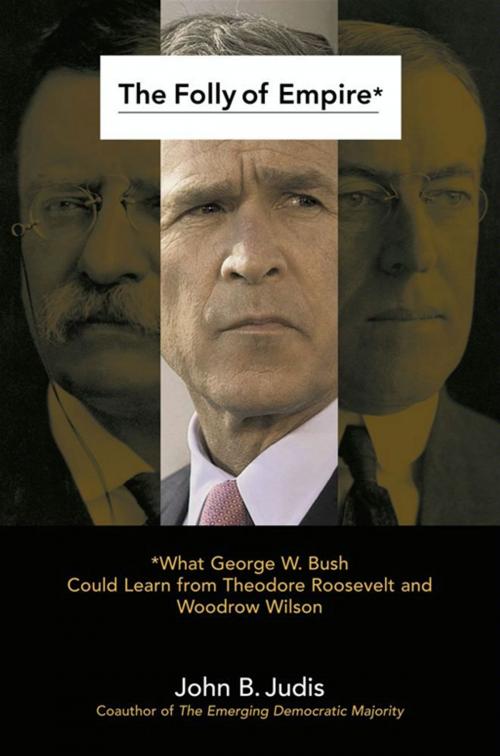The Folly of Empire
What George W. Bush Could Learn from Theodore Roos
Nonfiction, History, Americas, United States, 20th Century| Author: | John B. Judis | ISBN: | 9781439103951 |
| Publisher: | Scribner | Publication: | May 11, 2010 |
| Imprint: | Scribner | Language: | English |
| Author: | John B. Judis |
| ISBN: | 9781439103951 |
| Publisher: | Scribner |
| Publication: | May 11, 2010 |
| Imprint: | Scribner |
| Language: | English |
The New York Times hailed John B. Judis's The Emerging Democratic Majority as "indispensable." Now this brilliant political writer compares the failure of American imperialism a century ago with the potential failure of the current administration's imperialistic policies.
One hundred years ago, Theodore Roosevelt believed that the only way the United States could achieve peace, prosperity, and national greatness was by joining Europe in a struggle to add colonies. But Roosevelt became disillusioned with this imperialist strategy after a long war in the Philippines. Woodrow Wilson, shocked by nationalist backlash to American intervention in Mexico and by the outbreak of World War I, began to see imperialism not as an instrument of peace and democracy, but of war and tyranny. Wilson advocated that the United States lead the nations of the world in eliminating colonialism and by creating a "community of power" to replace the unstable "balance of power." Wilson's efforts were frustrated, but decades later they led to the creation of the United Nations, NATO, the IMF, and the World Bank. The prosperity and relative peace in the United States of the past fifty years confirmed the wisdom of Wilson's approach.
Despite the proven success of Wilson's strategy, George W. Bush has repudiated it. He has revived the narrow nationalism of the Republicans who rejected the League of Nations in the 1920s. And at the urging of his neoconservative supporters, he has revived the old, discredited imperialist strategy of attempting to unilaterally overthrow regimes deemed unfriendly by his administration. Bush rejects the role of international institutions and agreements in curbing terrorists, slowing global pollution, and containing potential threats. In The Folly of Empire, John B. Judis convincingly pits Wilson's arguments against those of George W. Bush and the neoconservatives.
Judis draws sharp contrasts between the Bush administration's policies, especially with regard to Iraq, and those of every administration from Franklin Roosevelt and Harry Truman through George H. W. Bush and Bill Clinton. The result is a concise, thought-provoking look at America's position in the world -- then and now -- and how it has been formed, that will spark debate and controversy in Washington and beyond. The Folly of Empire raises crucial questions about why the Bush administration has embarked on a foreign policy that has been proven unsuccessful and presents damning evidence that its failure is already imminent. The final message is a sobering one: Leaders ignore history's lessons at their peril.
The New York Times hailed John B. Judis's The Emerging Democratic Majority as "indispensable." Now this brilliant political writer compares the failure of American imperialism a century ago with the potential failure of the current administration's imperialistic policies.
One hundred years ago, Theodore Roosevelt believed that the only way the United States could achieve peace, prosperity, and national greatness was by joining Europe in a struggle to add colonies. But Roosevelt became disillusioned with this imperialist strategy after a long war in the Philippines. Woodrow Wilson, shocked by nationalist backlash to American intervention in Mexico and by the outbreak of World War I, began to see imperialism not as an instrument of peace and democracy, but of war and tyranny. Wilson advocated that the United States lead the nations of the world in eliminating colonialism and by creating a "community of power" to replace the unstable "balance of power." Wilson's efforts were frustrated, but decades later they led to the creation of the United Nations, NATO, the IMF, and the World Bank. The prosperity and relative peace in the United States of the past fifty years confirmed the wisdom of Wilson's approach.
Despite the proven success of Wilson's strategy, George W. Bush has repudiated it. He has revived the narrow nationalism of the Republicans who rejected the League of Nations in the 1920s. And at the urging of his neoconservative supporters, he has revived the old, discredited imperialist strategy of attempting to unilaterally overthrow regimes deemed unfriendly by his administration. Bush rejects the role of international institutions and agreements in curbing terrorists, slowing global pollution, and containing potential threats. In The Folly of Empire, John B. Judis convincingly pits Wilson's arguments against those of George W. Bush and the neoconservatives.
Judis draws sharp contrasts between the Bush administration's policies, especially with regard to Iraq, and those of every administration from Franklin Roosevelt and Harry Truman through George H. W. Bush and Bill Clinton. The result is a concise, thought-provoking look at America's position in the world -- then and now -- and how it has been formed, that will spark debate and controversy in Washington and beyond. The Folly of Empire raises crucial questions about why the Bush administration has embarked on a foreign policy that has been proven unsuccessful and presents damning evidence that its failure is already imminent. The final message is a sobering one: Leaders ignore history's lessons at their peril.















